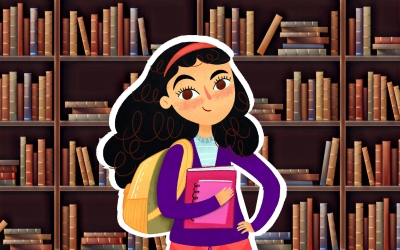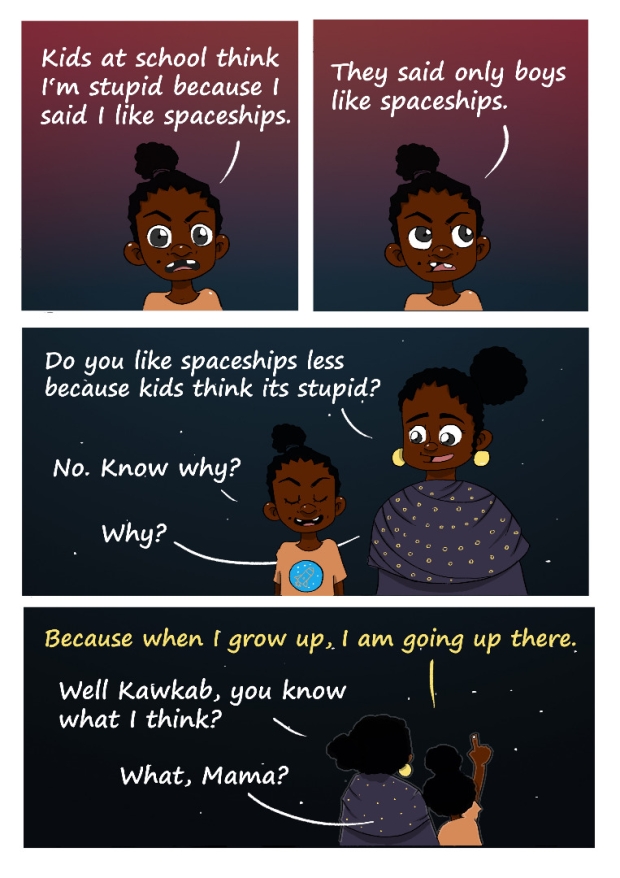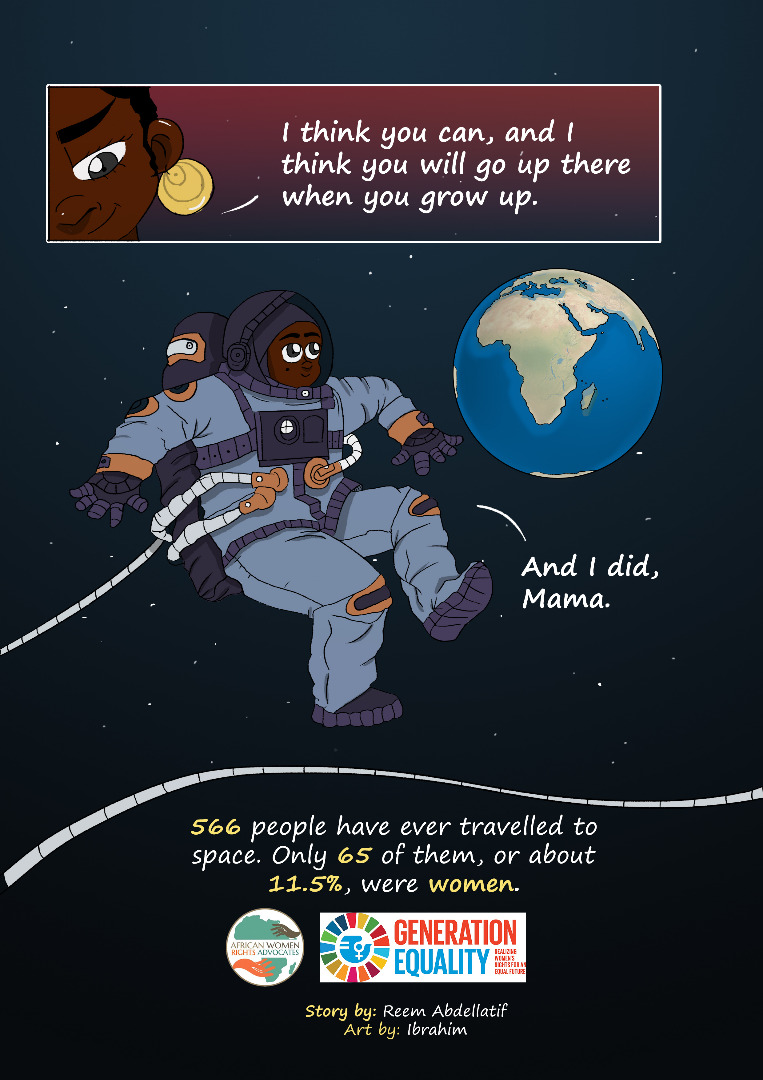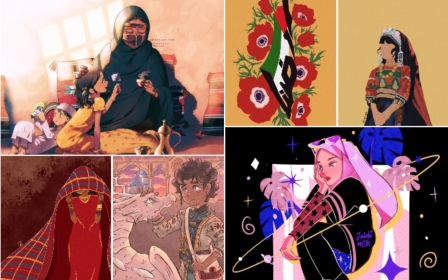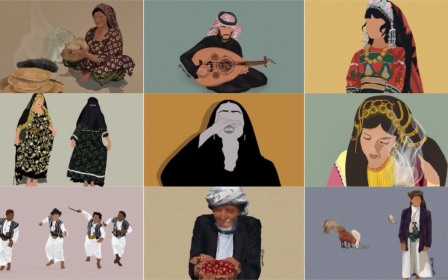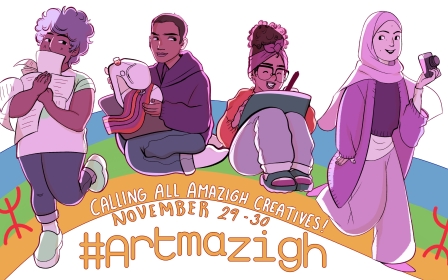A new Sudani superhero wants to empower young girls in the Middle East
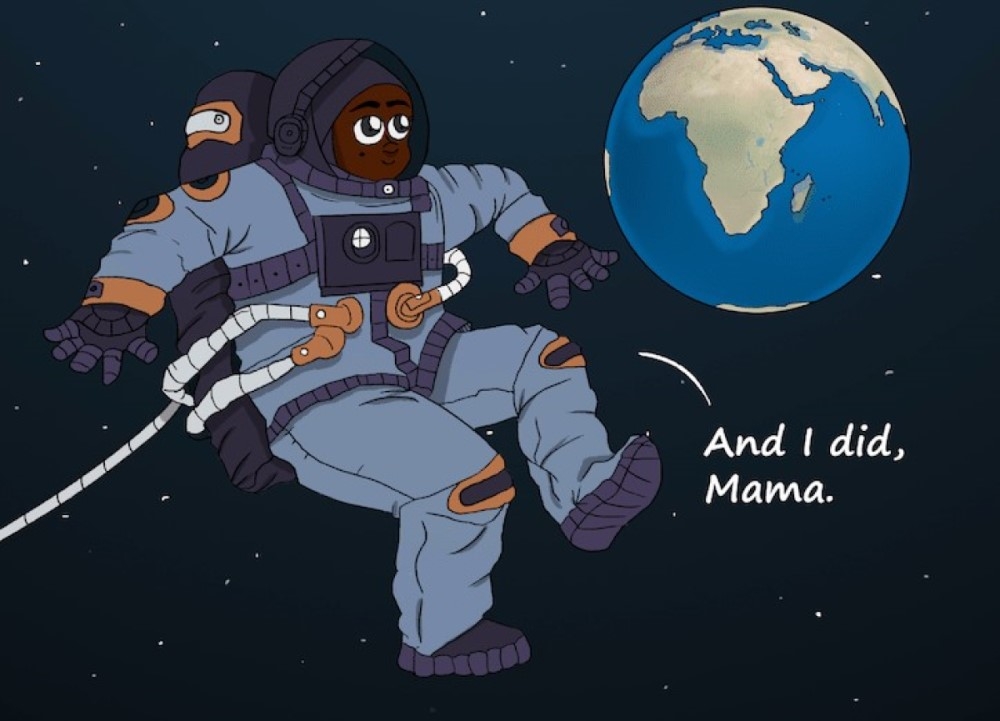
The daughter of Egyptian immigrants in the Netherlands, Reem Abdellatif rarely saw characters who looked like her in the media.
She has spoken frankly about her personal experience with abuse and of the bullying she suffered at school and says seeing others like her represented on the TV screens and between the covers of comics could have helped her cope with her personal traumas.
New MEE newsletter: Jerusalem Dispatch
Sign up to get the latest insights and analysis on Israel-Palestine, alongside Turkey Unpacked and other MEE newsletters
“Seeing sheros, or characters that resonate with me as a girl of colour, would have made a huge difference in my life at the time," she says.
As an adult, Abdellatif wants to ensure others like her have that comfort and to that end she created Kawkab, a ten-year-old Sudanese girl with superpowers that allow her to defy space and time fulfilling her dream of becoming a space traveller.
The concept of the comic was launched in August by Abdellatif, an Egyptian-American journalist now living in the Netherlands and the co-founder of the African Women Rights Advocates (AWRA), an organisation that empowers women through education, art and activism.
Explaining the concept, Abdellatif says: "[Kawkab] is part of a wider series about a group of friends who travel to space; many of them are astronauts, others are young scientists and space engineers. The series takes us through their adventures as they form unlikely friendships, overcome bullying, and stereotypes.”
In one of the illustrations, a young Kawkab is seen looking upset, explaining that she was bullied in school for her fascination with space travel.
“Kids at school think I’m stupid because I said I like spaceships. They said only boys like spaceships,” she says.
Later in the comic, another illustration shows Kawkab floating in space with a look of elation on her face having achieved her dreams, with her mother’s encouragement and support.
The story is part of a wider series of comics, designed to inspire and empower young girls in the Middle East and North Africa (MENA) region.
“When I was a child, kids got bullied for being into science. Kawkab's superpower is her ability to dream big and turn those dreams into reality," Abdellatif says.
Tackling women’s issues
For Abdellatif, the comic was inspired by her personal journey, and the ongoing Covid-19 pandemic created a sense of urgency in turning the idea into a tangible concept.
“During the Covid-19 lockdown, African girls were at greater risk of harmful practices such as female gential mutilation (FGM) or domestic violence,” she says.
"Many girls in countries like Kenya, Sudan and Egypt were being taken out of schools and being forced to face FGM or child marriage."
FGM continues to be a widespread practice in parts of Africa despite repeated calls for governments to outlaw it. According to Unicef, the Middle East and North Africa accounts for a quarter of all FGM cases globally.
Though banned in Egypt since 2008, the country, the most populous in the Arab world, still has one of the highest occurrences of the practice globally. In Sudan, the practice was criminalised in 2020 after protests by women's rights groups.
More focus on women's issues
Abdellatif collaborated with the popular Sudanese artist from Abbas Comics, Ibrahim, who tells MEE that the partnership with AWRA was a perfect fit.
“The project fell in line with the current socio-political climate in Sudan, with the transitional Sudanese government’s promises to tackle social issues, and to put more focus on issues concerning women and children in the country,” he says.
The comic is targeted at young children, specifically girls of colour between the ages of six and 13.
Kawkab’s story was chosen to encourage young girls to pursue careers in space and science, and follow their interests regardless of any challenges they may face.
For Abdellatif however, the comic also had a greater purpose of reclaiming the narrative and fighting patriarchal ideologies.
“Middle Eastern women face gender discrimination on many fronts - from their own patriarchal governments, ultra-traditional societies and colonialist perspectives deeply rooted in racism.” She says.
“Educating young girls through art, whether it be comics, books, or animations can be very empowering and allows us as survivors of gender based violence to reclaim the narrative."
Campaigns for women
Abdellatif says that the idea of the comics started around October 2020, when she became more heavily involved in the NGO she co-founded, AWRA.
The survivor-led organisation is composed of women activists from the Middle East and in the diaspora, who are keen to shed light on issues that are seen as taboo within communities.
'Today, girls and women in the MENA region and Africa need allies and partners, not saviours - especially the younger generations'
- Reem Abdellatif
AWRA has also worked on other projects and campaigns besides comics, including raising awareness on period poverty. The organisation met with young women in Kenya to help educate young girls on menstrual hygiene, and ensure that young women have access to resources, and are not hindered by cultural shame.
In Gambia, the organisation participated in community development with a series of workshops teaching people about FGM and child marriage.
The group's website features educational illustrations which are designed to educate women and men on issues such as consent. One illustration, titled ‘what does consent look like?’ outlines what constitutes consent and what does not.
Abdellatif says she has received positive feedback for the work AWRA is doing, especially the Kawkab concept, and hopes to expand the series even further to cover other issues.
“Today, girls and women in the MENA region and Africa need allies and partners, not saviours - especially the younger generations."
This article is available in French on Middle East Eye French edition.
Middle East Eye delivers independent and unrivalled coverage and analysis of the Middle East, North Africa and beyond. To learn more about republishing this content and the associated fees, please fill out this form. More about MEE can be found here.


